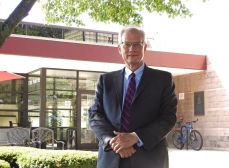University of Georgia invests more than $2M to expand high-performance computing center

The University of Georgia plans to spend millions upgrading and expanding its high-performance computing resources to support hiring 50 new faculty skilled in artificial intelligence and data science.
UGA’s Enterprise Information Technology Services announced Wednesday the university is investing more than $2.3 million over the next year into the Georgia Advanced Computing Resource Center. But building out the high-performance computing system to support researchers isn’t as simple as just adding more hardware, Chief Information Officer Timothy Chester told EdScoop.
Though a portion of the money is planned to build that technical capacity and address a “dramatic” need for more storage, Chester said accommodating new researchers and encouraging existing faculty to take advantage of resources is rooted in communication. Faculty require specific software or hardware to run their projects, he said, and they also need training and support for their research teams and postdoctoral students.
Chester’s office oversees the high-performance computing system and is contributing $350,000 to the center. As the university interviewed the new faculty as part of a “Presidential Hiring Initiative,” members of Chester’s team discussed with potential hires how high-performance computing could support their work, he said.
“We run a very large cluster and some of some of the work by our faculty and our new potential faculty are best served on that large cluster,” Chester said. “Some of them basically, frankly, just need high performance workstations on their desk. That’s all they need and we’ll try to match them up with the services that best fit.”
About 25 of those faculty started last week, he said, and UGA plans to hire the remaining 25 next year. The effort is interdisciplinary, focusing on researchers who can apply data science and AI in areas like modeling infectious diseases or transportation engineering.
High-performance computing is a key technology for federal agencies that fund university researchers, like the National Science Foundation and the Department of Energy. Along with institutions funding and developing their own systems, some states and groups of schools have also formed high-performance computing networks to promote access.
That access and having technical support can help differentiate proposals in a competitive research environment, Chester said. He added that he often collaborates with researchers to write out a plan that clearly states what support UGA will offer through its high-powered computing resources to bolster proposals.
“We really want to meet faculty where they are in terms of providing them with support,” he said. “Again, that could be a variety of things given the type of research that they are conducting — everything from high powered workstations on their desktop to operating in our large supercomputing cluster that the university operates, or frankly, helping them use cloud based services like Amazon Web Services.”




